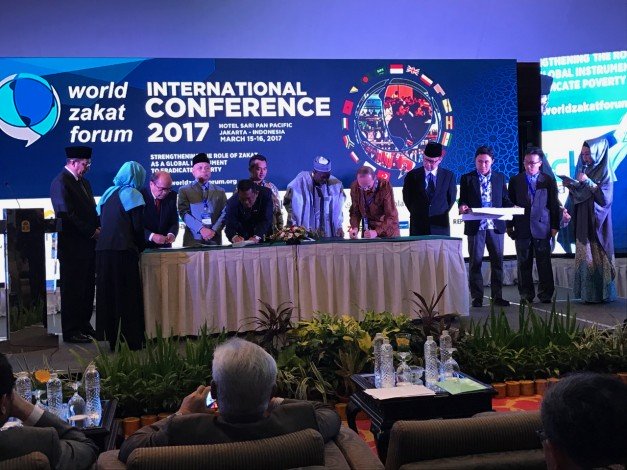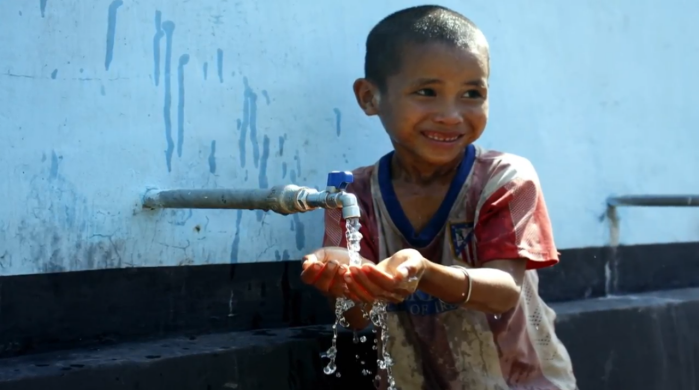
The Government of Canada and the United Nations Development Programme (UNDP) Indonesia agreed to strengthen the role of social finance in funding development actions in Indonesia. In partnership with women led social enterprises, this will contribute to achieve the sustainable development goals (SDGs)

Ending poverty and inequality are some of today’s greatest challenges that the Sustainable Development Goals (SDGs) aim to overcome. Considering Islamic principles support a socially inclusive development, funding from Islamic giving, zakat, has the potential to play a crucial role in accomplishing the SDGs

Profit and equality go hand-in-hand. Citizens, Government, United Nations and private sector leaders call on all organizations to create policies that advance gender equality. Glass ceilings and gender gaps were challenged at today’s Women, Organizations and Growth event hosted by United Nations Development Programme Indonesia (UNDP) today. The event, in the lead up to International Women’s Day, coincided with the launch of UNDP’s Gender Equality Strategy 2017-2020.

Zakat in Arabic means “that which purifies.” Most Indonesians associate it with charitable giving in the Muslim holy month of Ramadhan. Personally, it reminds me of my childhood when my aunt and uncle went to the least privileged of my grandma’s neighbors with a stack of white envelopes to give away. Zakat is in fact a sort of religious tax, a Muslim’s obligation to give a portion of their wealth to charity. Islam also encourages other forms of religious giving that are not compulsory. Like in my family, most religious charitable practices are informal and sporadic. But the potential for impact is high

Transport options are limited for sixteen-year-old Rina, a student in Makassar. She relies on her parents to drive her to school every day. “Usually, it takes around 30 minutes to arrive, but if there’s a traffic jam, I get out of the car and run, because I don’t want to be late to class

Ramadhani Lutfi Aerli, a nine-year-old boy from Pekanbaru, suffered a high fever and seizure on 20 October 2015. When he went unconscious in the middle of the night, his parents rushed him to the hospital but he died before the morning call to prayer.

Indonesia has one of the world’s highest rates of deforestation. Efforts to slow down the loss of tree cover have included a moratorium on the clearing of certain primary forests and peatlands, but limited law enforcement capacity has hampered progress. The United Nations Development Programme (UNDP) has been working with the Government of Indonesia under the UN’s Reducing Emission from Deforestation and Forest Degradation (REDD+) scheme, funded by the Norwegian government, to tackle deforestation by improving livelihoods around the forests. Communities in and around forest areas often have no choice but to cut the trees to sell the timber, or clear the forest to make way for plantations. But the livelihood programs give people alternative sources of income so they do not only refrain from clearing the forest, but also help in protecting the forest. For the second and last piece in these series, we look into a small scale palm sugar industry.

He ties a t-shirt around his head, leaving a small gap to see through. A rope is fastened around his waist attached to a plastic bucket. Wedged into the back of his pants is a long, sharp knife with a heavy wooden handle. He’s about to climb barehanded 30 meters up one of Indonesia’s largest trees, the majestic Boan tree. Just another day in the office for the Sumbawan honey hunter.

Women have contributed significantly in ending hostilities and paving the way to resolutions of conflicts in many places in Indonesia. The Hidden Pearls – Heroic Stories of Women Peace Builders is a collection of lessons learned from conflict areas including Ambon, Aceh, and Poso. The book was produced by United Nations Development Programme (UNDP), with the support of N-Peace, and launched today with a panel discussion at Plaza Indonesia.

Indonesia has one of the world’s highest rates of deforestation. Efforts to slow down the loss of tree cover have included a moratorium on the clearing of certain primary forests and peatlands, but limited law enforcement capacity has hampered progress. The United Nations Development Programme (UNDP) has been working with the Government of Indonesia under the UN’s Reducing Emission from Deforestation and Forest Degradation (REDD+) scheme, funded by the Norwegian government, to tackle deforestation by improving livelihoods around the forests. Communities in and around forest areas often have no choice but to cut the trees to sell the timber, or clear the forest to make way for plantations. But the livelihood programs give people alternative sources of income so they do not only refrain from clearing the forest, but also help in protecting the forest.

The Indonesia Democracy Index (IDI) has been a feature of the country’s democracy since 2009. Supported by the United Nations Development Programme (UNDP), the Index measures the performance of Indonesia’s democratic institutions and systems. The 2015 report was launched today by the Coordinating Minister for Political, Legal and Security Affairs Wiranto.

My heart rate increased this morning as I woke up to consider what more can we do to stop what is an absurdly and unacceptably common phenomenon: violence against women. This fight has become more personal and all the more urgent, now that I have two young daughters. As a mother, I try to help them become empowered and confident girls able to resist violence if they encounter it.

At the fifth Responsible Business Forum, United Nations Development Programme (UNDP) today called on business leaders to take a greater role in the new development era in order to support the achievement of the Sustainable Development Goals (SDGs). This Forum, opened in Singapore by UNDP and Global Initiatives, aims to address a sea change in the nature of development funding by creating a new partnership for sustainable development. While foreign funding (Official Development Assistance) is still essential for the development system, it now accounts for 0.7 percent of total financial flows in Asia-Pacific (down from 13.5 percent in 1990), while domestic public and private finance accounts for 89 percent, according to a UNDP report launched last month.

It is one year since every country in the world signed up to the Sustainable Development Goals. They form a blueprint for addressing the most significant challenges facing our planet and its people. Challenges like climate change. This is likely to be the hottest year on record and here in Asia, climate change is a cause of the natural disasters that have claimed half a million lives in the last decade. Challenges like inequality, which has been growing for four-fifths of Asia-Pacific’s population over the last 20 years. Challenges brought on by the accelerating process of ageing, which will make it harder for many Asian states to provide basic services to their people. The 17 SDGs will address these challenges and other interlinked issues, including education, hunger and security. But governments cannot implement this blueprint on their own. Nor can the UN and other development organizations.

The spirit of gotong royong is taught to children from a very young age at schools all over Indonesia. It is the Indonesian brand of volunteerism, or communal work—where members of a community gather to accomplish a task. Traditionally, the task could be to fix a neighbor’s home, or build a road or a bridge.

The United Nations Development Programme (UNDP) and Global Initiatives, Singapore will welcome over 600 business & sustainability leaders, senior government officials, UN agencies, NGOs from across the globe for the Responsible Business Forum on Sustainable Development (RBF) in Singapore on 22-24 November 2016. Large-scale conferences tend to be highly resource-intensive with major sources of greenhouse gas emissions, pollution and waste for the host city and residents. Taking the environmental impact into consideration, the 5th Responsible Business Forum in Singapore sets itself the ambitious target to be Asia’s first Zero Waste to Landfill Zero Emission Event, underpinning its commitment to a sustainable economy not only with the issues addressed in the programme but also in the logistics of putting the event together. This is the first time such efforts have been undertaken at a large-scale business conference in Asia.

In spite of its infamous environmental track record, palm oil has brought considerable prosperity to rural Indonesia. However, as market demands for sustainable palm oil rise, the future remains uncertain for many small-scale oil palm farmers who are dependent on the cash crop. Often unable to afford the capital required to invest in better agronomic practices, which limit the need for further plantation expansion, some small-scale farmers are at risk of being cut out of the market with little alternatives to turn to.

The United Nations Development Programme (UNDP) and the Asia-Pacific Development Effectiveness Facility (AP-DEF) opened a two-day meeting on aid ahead of the upcoming Global Partnership for Effective Development Cooperation. More than 100 government delegates and development experts are exploring how to design integrated national financing frameworks for the implementation of the Sustainable Development Goals (SDGs) in Asia-Pacific. “Domestic sources of finance are emerging as a key driving force for sustainable development in Asia-Pacific,” said Haoliang Xu, UN Assistant Secretary-General and UNDP Director for Asia and the Pacific. “These new sources of finance allow us to expand the existing development cooperation and partnership.”

Imron, a 35-year-old boat driver and a father of two, is a modern day sea gypsy. He is part of the Bajau community in Indonesia’s South East Sulawesi—no longer nomads but still hunting for their food and living in stilt houses above the water. “We are born and die from the sea,” he told me. “We believe that our ancestors are sea animals. When I was born, the elder saw that I was accompanied by a mythical octopus. This means I do not eat octopus and if I am lost at sea, my ancestral octopus will guide me.”

The United Nations Development Programme (UNDP) Indonesia, Statistics Indonesia (BPS), and Rifka Annisa, conducted a survey on health and life experiences in four districts in the provinces of Papua and West Papua. It found the rate of violence against women to be similar to the global statistics—38 percent of women who participated in the study have experienced a physical or sexual violence at least once.

